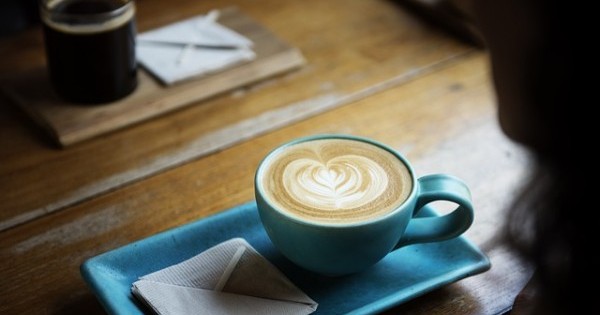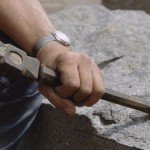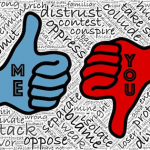
Galen Broaddus (atheist blogger at Across Rivers Wide): I don’t know about the two of you, but these days, I feel like I’m having to make a more conscious effort to engage in self-care. (Some of that is personal for me, but some of it is just the chaotic landscape of politics and news and such.)
Is that true for either of you? I’m always curious to see how others find ways to stay balanced.
Hind Makki (Muslim blogger at Hindtrospectives): Absolutely. I feel a lot more aware of my own emotional well-being and while in the past I may have just tried to power through the ups and downs, lately, I’ve decided that self-kindness is an incredibly important ingredient in maintaining emotional balance.
Galen: It’s been difficult for me to remember that because even though I completely agree with the mantra that “Self-care is not selfish,” there are times when it’s hard not to feel that way. But I do agree.
Hind: Right, or the somewhat cliché, “You can’t pour from an empty cup,” but it’s so true. Are your self-care activities something you do on your own, or do you like to be in community for them?
Andy Gill (progressive Christian blogger at Andy Gill): Ditto ditto ditto. It’s just such a tough entity to master. Discipline, I struggle in having.
Galen: I wouldn’t say “in community,” per se, but not alone. Spending more time with my family (and my wife in particular) has been a significant part of that.
I guess family could count as “community” under at least some definitions, though!
Hind: Sometimes, I feel so inundated with the noise of the news and all the pundits and talking heads, that I literally unplug. Turn off my devices and pick up a paper book, or start cooking, or painting. I have always thrived in solitude, but sometimes, I do crave being in community; joining friends for an occasional evening out. And my weekly meditation/zikr group has been a critical component of my self-care regimen since the election.
Andy: Yaaassss meditation!
Galen: On the political front, this might seem a bit perverse, but I’ve actually been enjoying the show Designated Survivor because it’s about a guy who never wanted to be president but is trying to run the government as competently as possible despite a massive crisis. In the light of the current political situation, that is…oddly refreshing, ha.
Hind: Ha, yes! I was watching Designated Survivor, but didn’t continue the season. That premise is very interesting juxtaposed with our current situation. Also, catching Seth Meyers’s “A Closer Look” segments has become my favorite news analysis…comedy and satire are great for self-care!
Andy: I mean basketball, meditation, journaling, and of course, the occasional going out with friends for a drink. But Hind, your comment reminded me of this quote I recently came across: “I believe that introversion is my greatest strength. I have such a strong inner life that I’m never bored and only occasionally lonely. No matter what mayhem is happening around me, I know I can always turn inward.” As for me personally, introversion and my need for alone time/refueling time has been accentuated over the past few years.
I’m curious, have either of you ever dealt with burnout? And, if so, how did you recover from it and comeback from it? (Personally I deal with it every. single. year…)
Galen: I’ve gone through so many cycles of burnout. I always have to step back and refocus my efforts on new things.
Hind: Yes, burnout is my nemesis. Since a lot of my work is dependent on engaging with others (activism around building more inclusive mosques, dealing with Trump’s travel ban as someone whose family immigrated from one of the banned countries, making the argument for faith-based feminism), I do find myself needing to unplug from social justice issues and the world from time to time. I have to distance myself, dive into something totally unrelated, and then return to activism when I’m rejuvenated.
Andy: This all reminds me of that TED talk regarding “play” as a means to not just avoiding burnout, but having a more overall productive life…
Hind: I also find ritual (not sure if this is the best word — interested to hear your thoughts about terminology) to be helpful. Every year in the summer, I re-read the Harry Potter series. It’s a thing I do, it anchors my summer months, and I look forward to my weeks of diving into the magical fight against fascism every year, though I’m not thinking about HP for the rest of the year. It’s a sort of secular ritual, a gift to myself.
Galen: As a secular person who finds rituals to be useful and meaningful, I think “ritual” is a fine way to describe that.
Andy: Same — I also have found that although routine is not exactly “ritual,” when having routines and systems during the day-to-day I’ve been able to function and operate with a bit more sustainability…
I guess that brings up another question, maybe for another discussion, of “what then makes a routine into a ritual?”
Galen: In my experience, routines are more about structures for daily living. Rituals are more intentional ways of creating meaning. (And of course, those are not mutually exclusive categories!)
Hind: Ooh, great question! For me, routine turns into ritual when I imbue meaning into it. I can have my morning coffee and croissant and just get to work, or I can spend 10 minutes — unplugged — savoring the flavors and feeling caffeine course through my veins. Setting aside 10 minutes and intentionally starting my day unplugged changes how I use my time the rest of the day. It makes those 10 breakfast minutes more meaningful, so they become ritual, rather than just routine. Now if only I can get rid of the routine of checking Twitter the second I wake up…
Andy: Yes, presence. It feels as if being present is such a lost art these days.
I’ve heard it said that the lack of presence literally warps our brains, being linked to depression, anxiety, and a various of other related mental health symptoms/illnesses.
Hind: Sounds about right…
Andy: Sherry Turkle has done a lot of the work regarding this new day and age of technological advancements.
Hind: I definitely think technology affects our well-being. I know that I have to reconcile my wanting to be present with my overwhelming desire to be connected online. It can be very unhealthy.
Galen: That is the double-edged sword of technology: It can allow us to tap into much bigger networks of connections. (And in fairness, it’s allowing us to connect across two time zones!) But the drive to be connected elsewhere all the time certainly has its pitfalls.
Hind: Yes, and sometimes technology actually facilitates self-care, as you find new poetry, or forge new connections with people. It’s just a tool; it becomes what we make of it.
Galen: Well, that’s a lot to consider this week as I’m doing my own regimen of self-care. Best of luck to both of you in your own process of finding balance!
Image via Pixabay










